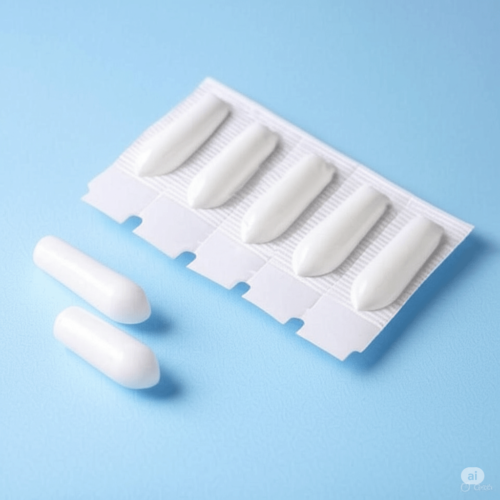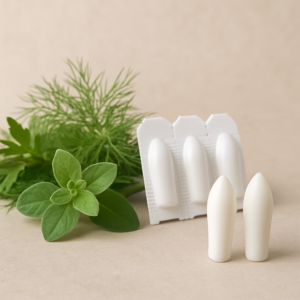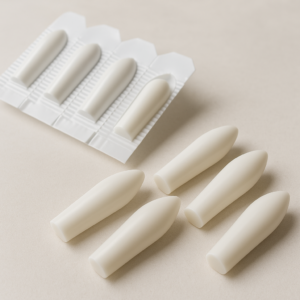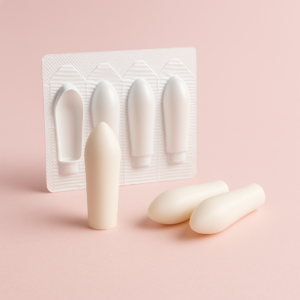Suppositories Manufacturing – Quality, Compliance & Innovation
Introduction
We specialize in the formulation and manufacturing of suppository products for international markets, delivering high-quality solutions that meet stringent compliance standards. Suppositories are solid dosage forms designed to melt, soften, or dissolve at body temperature, providing options for both localized and systemic delivery. This alternative dosage form offers unique benefits by bypassing the gastrointestinal tract, making it suitable for applications where conventional formats may be less effective.

Send Enquiry
Suppositories Manufacturing – Quality, Compliance & Innovation
Herbal Suppositories
Formulated by blending traditional herbal extracts and oils into a suitable base, ensuring consistency, stability, and compliance with modern quality standards. Developed for specialized uses, including Ayurvedic such as precision solution with triphala and neem, as well as products designed for vaginal wellness and hygiene support.
Rectal Suppositories
Typically cone- or torpedo-shaped, rectal suppositories are the primary format used in global markets. Designed for delivery of actives where oral intake may not be suitable, including fever-reducing, anti-nausea, and migraine formulations. Also used for targeted relief, such as haemorrhoid care, constipation management, and laxative support.
Vaginal Suppositories
Shaped in ovoid, globular, or cone forms for easy insertion into the vagina, ensuring proper placement and stability. Formulated for targeted delivery, such as yeast infection care, bacterial balance support, hormonal therapies, and moisturizing solutions.



Packaging, Labelling & Special Content
Primary Packing
- Blister packs: PVC/ALU or ALU/ALU blisters are the absolute standard. They protect the suppository from deformation, oxidation, and contamination. They also provide individual dosing and excellent stability.
- Pre-formed plastic molds: Sometimes used within a carton for patient convenience.
- Foils: Individual foil wraps are a traditional method, still used for some products.
Box Packaging
- Folding Cartons: Used to hold blister strips. Provides light protection, branding space, and essential user information.
- Mandatory Content: Product Name, Net Quantity, Batch Number, Manufacturing & Expiry Date, Full Ingredient List, Name & Address, Directions for Use: For rectal vaginal use only, Remove from blister right before use, Warning Statements: Keep out of reach of children, Store in a cool place, Discontinue use if irritation occurs.
- Technical Details: Often states the active ingredient strength and the type of base if relevant.
- Special Content: Soothing Relief, Fast-Acting, For Systemic Absorption, Herbal Formula, QR Codes.
Manufacturing & In-Process Control
In-Process Control
Dispensing- All raw materials are accurately weighed and recorded in the Dispensing Record for full traceability.
Base Preparation- The suppository base is melted under controlled temperature to avoid polymorphic changes that may alter melting behaviour.
Active Incorporation- Active ingredients are uniformly dispersed or dissolved into the molten base. For suspensions, continuous mixing ensures homogeneous distribution.
Moulding- The molten mass is poured into pre-lubricated or non-stick moulds, with strict temperature control to prevent sedimentation or uneven fill.
Cooling & Solidification- Moulds are transferred to a cooling chamber or tunnel, allowing the suppositories to solidify under controlled conditions.
Ejection & Inspection- Solidified units are removed from moulds and visually inspected for cracks, surface defects, or fill inconsistencies.
Documentation- Every critical parameter—temperatures, mixing speeds, and cooling times—is logged in the Equipment Logs and Batch Manufacturing Record to ensure compliance and audit readiness.
- Dispensing: Precise weighing of all components. Document: Dispensing Record.
- Base Preparation: The suppository base is carefully melted under controlled temperature to avoid polymorphic changes that can affect the melting point.
- Active Incorporation: The active ingredient is uniformly dispersed or dissolved into the molten base. For suspensions, mixing is maintained to ensure homogeneity.
- Moulding: The molten mass is poured into pre-lubricated or non-stick suppository molds. Critical Step: Temperature control during pouring is vital to prevent sedimentation or uneven distribution.
- Cooling & Solidification: The filled molds are transferred to a cooling tunnel or chamber to solidify.
- Ejection & Inspection: Suppositories are ejected from the molds and visually inspected for surface flaws, cracks, or fill imperfections.
- Documentation: Every parameter is logged in Equipment Logs and the Batch Manufacturing Record.












